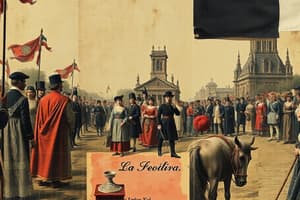Podcast
Questions and Answers
Which of the following best explains the composition of the Third Estate in pre-revolutionary France?
Which of the following best explains the composition of the Third Estate in pre-revolutionary France?
- A small group of wealthy merchants and landowners who advised the King.
- The vast majority of the population, including peasants, commoners, and the bourgeoisie. (correct)
- The clergy and high-ranking church officials responsible for religious affairs.
- The nobility, including dukes, counts, and other aristocrats.
How did the heavy taxation in pre-revolutionary France contribute to the French Revolution?
How did the heavy taxation in pre-revolutionary France contribute to the French Revolution?
- It provided funds for public works, improving the quality of life for the common people.
- It strengthened the monarchy by increasing the king's wealth and power.
- It created resentment among the common people who bore a disproportionate share of the tax burden, leading to demands for reforms. (correct)
- It ensured the stability of the French economy, preventing inflation and economic downturn.
What was the primary purpose of convening the Estates General in 1789 by King Louis XVI?
What was the primary purpose of convening the Estates General in 1789 by King Louis XVI?
- To establish new trade agreements with foreign powers.
- To celebrate the King's birthday in a grand ceremony.
- To address the economic crisis in France and seek solutions. (correct)
- To plan a military campaign against neighboring countries.
What was the Reign of Terror, and which group was primarily responsible for it?
What was the Reign of Terror, and which group was primarily responsible for it?
What action did the National Assembly take against King Louis XVI in January 1793?
What action did the National Assembly take against King Louis XVI in January 1793?
Which statement best describes the living conditions of the common people in pre-revolutionary France?
Which statement best describes the living conditions of the common people in pre-revolutionary France?
Which of the following was one of the main consequences of the French Revolution?
Which of the following was one of the main consequences of the French Revolution?
How did the French Revolution influence movements for change in other parts of the world?
How did the French Revolution influence movements for change in other parts of the world?
Flashcards
Three Estates
Three Estates
Divisions in French society: clergy, nobility, commoners.
Taille
Taille
A land tax in France that burdened common people.
Estates General
Estates General
A representative body from the three estates, convened by King Louis XVI.
Reign of Terror
Reign of Terror
Signup and view all the flashcards
Execution of King Louis XVI
Execution of King Louis XVI
Signup and view all the flashcards
Social Inequality
Social Inequality
Signup and view all the flashcards
Liberty, Equality, Fraternity
Liberty, Equality, Fraternity
Signup and view all the flashcards
Rise of Napoleon Bonaparte
Rise of Napoleon Bonaparte
Signup and view all the flashcards
Study Notes
The French Revolution: Causes, Events, and Consequences
- The French Revolution was a period of major political and social change in France
- It involved a challenge to the existing social order, aiming for a more just and equitable society
The Three Estates
- French society was divided into three estates:
- First Estate: Clergy (Church members)
- Second Estate: Nobility
- Third Estate: Peasants and commoners (vast majority)
Taxation and Unrest
- French citizens faced heavy taxation, particularly the "Taille" (a land tax)
- This led to widespread dissatisfaction and a demand for reforms, fair treatment for the common people
The Estates General
- The Estates General was a representative body (a gathering) of all three estates
- It was convened by King Louis XVI in 1789 to address the economic crisis
- This gathering was important to represent the different Estates of France, to engage in decision-making
Causes of the French Revolution
- Bad Harvests and Rising Prices: Poor harvests led to hardship and increased bread prices
- Desire for Social Change: The Third Estate demanded equality and an end to the privileges of the nobility and clergy
Events of the French Revolution
- (Note: The provided text only gives a brief overview. More details about specific events would need a more detailed description.)*
The Reign of Terror
- The Jacobins, a radical group, held power during the National Convention
- Implemented a period of violence, known as the Reign of Terror, against those who opposed the revolution
Execution of King Louis XVI
- King Louis XVI was executed in January of 1793 for treason
- He attempted to regain power but was unsuccessful
Living Conditions Before the Revolution
- Significant disparities existed between the estates regarding privileges, taxation, and social inequality
- The nobility and clergy had many privileges and were exempt from some taxes, while the common people (Third Estate) faced heavier financial burdens
Consequences of the Revolution
- The French Revolution led to the rise of Napoleon Bonaparte
- The monarchy was abolished
- Concepts of liberty, equality, and fraternity (brotherhood and unity) became central to the nation's identity
- The Revolution inspired movements for change globally
Studying That Suits You
Use AI to generate personalized quizzes and flashcards to suit your learning preferences.
Related Documents
Description
Explore the French Revolution, a period of political and social change in France. Learn about the three estates, taxation issues, and the meeting of the Estates General. Understand the causes and demands for reform during this critical period.




